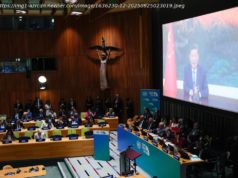Some progress on easing tensions between North and South Korea.
After the first day of face-to-face talks between delegations from North and South Korea in several years, the two countries have come to an agreement that will have the DPRK send a delegation to the Winter Olympics next month:
Clearly, this agreement to allow North Koreans to participate in the Olympics isn’t going to resolve all of the issues between North and South Korea, nor does it even come close to addressing the issues raised by North Korea’s nuclear and ballistic missile programs, its militaristic and bombastic rhetoric aimed at both its neighbors in South Korea and Japan and at the United States, and the massive military presence it has just across the Demilitarized Zone that could cause extensive damage all on its own. At the very least, though, it does seem to put to rest any fears that Kim Jong-Un could seek to use the attention that the Olympics will bring to the Korean peninsula for the better part of next month. Additionally, it seems to suggest that there’s at least some opportunity for the two sides to cool tensions on the peninsula down somewhat from the fever-pitch that they’ve been at for the better part of the past year. For that reason alone, this is arguably a good step forward, albeit a small one.
In addition to agreeing to an Olympic delegation, the two Koreas have apparently also agreed on a number of other matters that seem likely to ease tensions at least to some extent. The military hotline between the two countries that was shut down by the DPRK several years back when tensions began to rise will be kept open indefinitely, for example. Additionally, the parties agreed to hold further talks in the future to discuss other issues such as resuming the reunification program that allowed families that were left divided since the armistice that ended the Korean War, a program that was also ended several years ago amid rising tensions. Finally, the parties agreed to further discussions on the details of the upcoming Olympic visit, including perhaps most importantly the route that any North Korean delegation would take to get to Pyeongchang, where the games are being held.
All of this comes, of course, in the wake of Kim Jong-Un’s New Year’s Day speech in which he appeared to extend an olive branch to the south while at the same time maintaining the same strong militaristic rhetoric toward the United States. To some extent, it appears that at least part of what’s motivating him in part is a desire to draw South Korea away from the United States at least to some extent. As I noted in my post last week, the relatively new President of South Korea, Moon Jae-In, campaigned in part on a platform that included the idea of trying to reduce tensions with the north. To some extent, he was at least initially diverted from that path due in no small part to North Korea’s own rhetoric and actions, such as its most recent nuclear and ballistic missile tests. Additionally, it’s clear that the Republic of Korea isn’t going to drift away from the United States. Nonetheless, given the rhetoric being exchanged between the DPRK and the United States, the fact that the President of the United States has been boasting about the size of his “nuclear button,” and reports that the United States is considering an unprovoked first-strike against the North, extending an olive branch to the south is a pretty smart strategy on Kim Jong-Un’s part.
Faced with a volatile adversary of questionable capability and deep unpopularity, Kim finds the bar set pretty low. Even gestures of little consequence to him make him look pretty good in comparison.
Like or Dislike: 0






